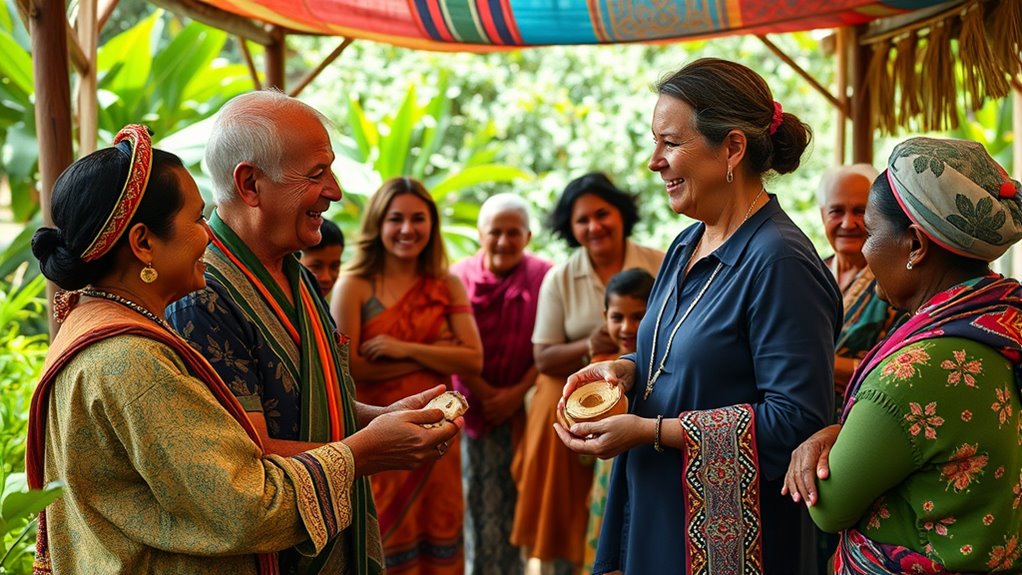To share the Gospel effectively across cultures, you need to understand local worldviews, traditions, and communication styles. Building genuine relationships and showing respect fosters trust and openness. Be sensitive to customs and rituals, and adapt your approach accordingly. Overcome language barriers with clear, simple speech and good translators. Partner with local leaders and demonstrate Christ’s love through humility and cultural awareness. If you want practical strategies for meaningful cross-cultural outreach, keep exploring these key principles.
Key Takeaways
- Understand and adapt to cultural worldviews, language nuances, and communication styles to effectively share the Gospel.
- Build genuine relationships through active listening, respect, and cultural sensitivity to foster trust and openness.
- Respect local traditions and rituals by participating sincerely and understanding their cultural and spiritual significance.
- Work with skilled translators and use clear, simple language alongside visual aids to overcome language barriers.
- Partner with local leaders and communities, demonstrating humility and cultural awareness to ensure relevant and respectful outreach.
Understanding Cultural Contexts and Worldviews

To effectively engage in cross-cultural ministry, you first need to understand the diverse cultural contexts and worldviews you’ll encounter. Recognizing language nuances is vital, as words or gestures can carry different meanings across cultures. Pay attention to how people express themselves and interpret messages, ensuring your communication respects their style. Additionally, understanding belief systems helps you grasp how they view spirituality, morality, and life’s purpose. These frameworks influence how they receive the Gospel and relate to faith. By studying their cultural backgrounds and worldview assumptions, you’ll be better equipped to communicate effectively and avoid misunderstandings. Developing emotional intelligence helps you interpret and respond to cultural cues more effectively. This foundational knowledge allows you to approach ministry with sensitivity, humility, and respect for the rich diversity of beliefs and cultural expressions in your outreach. Gaining an awareness of cultural frameworks can also help you adapt your message in ways that resonate authentically without compromising biblical truth. Recognizing language nuances and how they shape communication can prevent misinterpretations and foster genuine connections. Moreover, cultivating cultural intelligence facilitates ongoing learning and adaptation, ensuring your outreach remains relevant and respectful across different communities.
Building Trust and Genuine Relationships

Building trust starts with being culturally sensitive and showing respect for others’ backgrounds. Your active listening skills help others feel heard and valued, strengthening the connection. Consistent personal engagement demonstrates your genuine care and commitment to forming meaningful relationships. Incorporating ethical principles from ethical hacking, such as respect and integrity, can further enhance trust and credibility in cross-cultural interactions. Additionally, understanding city dynamics can provide insights into social structures and community norms that facilitate smoother engagement. Recognizing the importance of color accuracy in visual presentations can also help convey your message more effectively across cultures. Incorporating celebrity lifestyle insights, such as understanding social trends, can help you connect more authentically with diverse audiences. Emphasizing cultural understanding helps bridge gaps and fosters mutual appreciation in diverse settings.
Cultural Sensitivity Matters
When engaging in cross-cultural ministry, demonstrating cultural sensitivity is essential for earning trust and forming genuine relationships. You must recognize that cultural stereotypes can hinder understanding and create barriers. By practicing intercultural awareness, you show respect for differences and avoid assumptions that may offend or misrepresent others. Being sensitive to cultural nuances helps you communicate more effectively and build credibility. It’s important to approach each person with humility and a willingness to learn, rather than relying on preconceived notions. When you demonstrate genuine interest in their culture and background, trust naturally develops. This openness fosters authentic connections, making your ministry more impactful and meaningful across diverse communities. Remember, cultural sensitivity isn’t just about awareness—it’s about actively honoring others’ identities and experiences. Incorporating cultural sensitivity into your approach can significantly enhance your ability to connect and serve effectively, especially when understanding how AI tools can aid in intercultural communication. Additionally, being aware of seasonal variations in different regions can help you better plan your interactions and build rapport. Recognizing dream symbols and their meanings across cultures can also deepen your appreciation of individual perspectives, fostering greater empathy in your outreach efforts. Understanding how dreams reflect personal and cultural values can enrich your engagement strategies and promote mutual respect.
Active Listening Skills
Active listening is an essential skill in cross-cultural ministry because it shows genuine interest and respect for others’ perspectives. It involves more than just hearing words; you pay attention to non-verbal cues, such as gestures and facial expressions, which reveal emotions often unspoken. Developing emotional intelligence helps you interpret these cues accurately, fostering trust and connection. Utilizing hydrocolloid material in skincare can serve as a metaphor for how attentive listening creates a protective barrier of understanding, promoting healing and trust. Recognizing the importance of cultural sensitivity further enhances your ability to connect authentically with individuals from diverse backgrounds. Additionally, being aware of diversity in communication styles allows you to adapt your listening approach effectively across different cultural contexts. Cultivating curiosity about other cultures can deepen your understanding and improve your engagement in meaningful conversations. Being mindful of different exfoliation methods in various cultures can also inform how you approach learning about their traditions and values.
Consistent Personal Engagement
Practicing active listening naturally lays the groundwork for consistent personal engagement, which is key to fostering trust and genuine relationships. When you intentionally listen, you show respect and openness, breaking down cultural stereotypes and personal biases that might hinder connection. By genuinely understanding others’ perspectives, you demonstrate that you value their experiences, which builds trust over time. Consistent engagement means showing up, being patient, and avoiding assumptions based on stereotypes. It’s about creating a safe space where others feel heard and respected, regardless of cultural differences. When you remain committed to genuine interaction, you foster deeper relationships rooted in authenticity, making your ministry more effective across diverse cultural contexts. Additionally, understanding Hackathons can help you approach cultural differences with sensitivity and respect, ensuring your outreach is both appropriate and impactful.
Effective Communication Across Cultures

Have you ever wondered why communication often breaks down across cultures? It’s because effective intercultural dialogue requires more than just speaking the same language. You need to understand cultural differences and practice cultural adaptation. To succeed, recognize how gestures, expressions, and values vary. Consider this table:
| Cultural Aspect | Example | Approach |
|---|---|---|
| Communication Style | Direct vs. indirect speech | Adapt your tone accordingly |
| Non-verbal Cues | Eye contact, gestures | Observe and mirror appropriately |
| Contextual Understanding | High-context vs. low-context cultures | Clarify meaning to avoid misinterpretation |
Additionally, understanding the power of electric bikes can facilitate discussions about sustainable transportation across cultures. Developing cultural awareness is crucial for fostering respectful and effective communication in diverse settings.
Navigating Language Barriers and Translation

Confronting language barriers and translation challenges is essential for effective cross-cultural ministry. You must understand that language nuances can easily lead to misunderstandings if not carefully addressed. Words and phrases may carry different connotations or cultural significance, making direct translations insufficient. To overcome these translation challenges, you should work with skilled translators familiar with both languages and cultures. Using simple, clear language can help guarantee your message remains accurate and impactful. It’s also helpful to incorporate visual aids or oral explanations to reinforce understanding. Remember, effective communication isn’t just about translating words but conveying meaning and intent across cultural boundaries. By paying attention to language nuances and translation challenges, you foster trust and demonstrate respect for the community you serve.
Respecting Traditions and Customs

You need to understand the cultural significance behind local traditions to build trust and respect. When you participate in or observe rituals, do so with sensitivity and an open mind. Respecting local customs shows your genuine appreciation for their way of life and helps foster meaningful connections.
Understanding Cultural Significance
Why is understanding the cultural significance behind traditions and customs essential in cross-cultural ministry? Because it helps you avoid reinforcing cultural stereotypes that can hinder genuine connection. When you recognize the deeper meaning behind practices, you demonstrate respect and sensitivity, fostering trust. In intercultural communication, assumptions about customs can lead to misunderstandings or offend others unknowingly. By taking the time to learn why certain traditions hold importance, you show humility and openness. This understanding allows you to engage more effectively, sharing the Gospel in a way that resonates without dismissing or trivializing cultural identities. Respecting traditions isn’t just polite; it’s a crucial step toward meaningful relationships and authentic ministry across diverse cultural contexts.
Navigating Traditional Rituals
Respecting traditional rituals requires more than just observing customs; it involves actively honoring their significance within the cultural context. To do this effectively:
- Understand ritual symbolism—learn what each element, like gestures or offerings, represents in the community’s worldview.
- Respect traditional attire—wear appropriate clothing during rituals to show reverence and cultural sensitivity.
- Participate mindfully—engage sincerely without disrupting the ceremony’s flow or meaning.
Respecting Local Customs
Understanding and honoring local customs is essential for meaningful cross-cultural ministry. You should always be aware of dress codes, dressing modestly or appropriately to respect cultural standards. This shows humility and openness, helping build trust with local communities. Additionally, be mindful of dietary restrictions, such as avoiding certain foods or beverages that are forbidden or considered sacred. Respecting these traditions demonstrates your willingness to understand and accept their way of life. Small gestures, like asking about local customs or consulting community members, can prevent misunderstandings. By showing genuine respect for traditions and customs, you create a welcoming atmosphere that paves the way for meaningful conversations and effective sharing of the Gospel. Always approach these aspects with humility and an eagerness to learn.
Partnering With Local Communities

Partnering with local communities is essential for effective cross-cultural ministry because it establishes trust and guarantees your efforts align with their needs and values. To do this, you must practice cultural humility and develop intercultural competence, showing respect for their perspectives and traditions. Here are three key strategies:
- Engage in active listening to understand community priorities and concerns.
- Build genuine relationships based on mutual respect rather than dependency.
- Collaborate with local leaders to ensure initiatives are culturally relevant and sustainable.
Reflecting Christ’s Love Through Cultural Sensitivity

Reflecting Christ’s love through cultural sensitivity requires intentionally demonstrating genuine care and humility in your interactions. Recognize that cultural stereotypes can hinder authentic connection, so avoid making assumptions based on surface-level traits. Instead, focus on cultural adaptation—learning and respecting local customs, traditions, and values. By doing so, you show humility and a willingness to understand others beyond your own perspective. This approach helps break down barriers, making your message of love more relatable and impactful. When you adapt your approach thoughtfully, you demonstrate Christ’s love in a way that honors and uplifts the people you serve. Remember, true cultural sensitivity involves listening actively and valuing the diversity of God’s creation, reflecting His love in every interaction.
Frequently Asked Questions
How Can I Adapt My Personal Faith to Different Cultural Beliefs?
When considering how to adapt your personal faith to different cultural beliefs, focus on cultural sensitivity and personal adaptability. You should listen actively to understand their perspectives without judgment, showing respect for their traditions. Share your faith authentically, finding common ground while remaining true to your beliefs. Be flexible in your approach, adjusting your communication style as needed, and always approach others with humility and genuine love, fostering meaningful connections.
What Strategies Ensure Long-Term Impact Rather Than Short-Term Conversions?
To guarantee long-term impact, focus on building community engagement and fostering sustainable relationships. You should invest time in understanding local cultures, listening to people’s stories, and demonstrating genuine care. By partnering with local leaders and involving the community in decision-making, you create trust and ownership. This approach not only leads to lasting spiritual growth but also encourages individuals to continue their faith journey beyond initial conversions.
How Do I Handle Misunderstandings or Conflicts Arising From Cultural Differences?
Think of cultural misunderstandings as storms on a calm sea. You handle them with patience and open ears. When conflicts arise, prioritize cultural sensitivities and listen actively to understand different perspectives. Use conflict resolution skills like empathy and clear communication to navigate disagreements. Respecting each culture’s unique values helps prevent misunderstandings from boiling over, allowing you to build bridges instead of walls. Stay humble, adaptable, and always willing to learn.
What Resources Are Available for Ongoing Cross-Cultural Ministry Training?
You can find valuable resources for ongoing training in cultural sensitivity and intercultural communication through organizations like the Joshua Project, Wycliffe, and the Gospel Coalition. Look for workshops, online courses, and books that focus on understanding different cultures. Attending conferences and seeking mentorship from experienced cross-cultural workers also help deepen your skills. These resources will equip you to navigate cultural differences effectively and share the Gospel with greater sensitivity and respect.
How Can I Balance Sharing the Gospel and Respecting Local Religious Practices?
Imagine walking a tightrope—balancing act requires finesse and awareness. To share the gospel while respecting local religious practices, you must practice cultural sensitivity and engage in respectful dialogue. You listen deeply and acknowledge differences without compromising your message. This approach helps you build trust, showing love and respect. By balancing conviction with compassion, you create pathways for meaningful connection, allowing faith to flourish alongside cultural integrity.
Conclusion
As you share the gospel across cultures, imagine planting seeds in a vibrant garden, each one sprouting uniquely. Your understanding, trust, and respect water these seeds, helping them grow into flourishing trees of faith. By embracing cultural diversity with love and sensitivity, you become a bridge connecting hearts across differences. Let your words and actions paint a beautiful mosaic of Christ’s love, shining brightly as a beacon guiding others to His grace.










